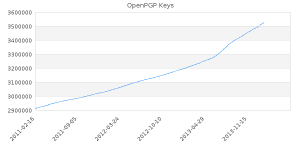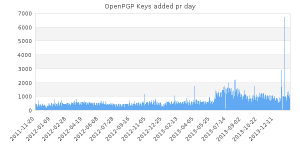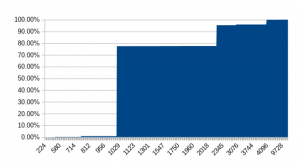Recently there has been some talk about the number of OpenPGP keys available on the various keyservers. My own contribution to this discussion is tracking the development at sks-keyservers.net . As can be seen on both the line chart of total number of keys, and the breakdown to a bar chart for daily addition, new keys are added at a higher rate today than it was just a few years ago, and without any statistical considerations, the change of rate seems to coincidentally correspond to the Snowden leaks.
This post will look into some of the underlying data and hopefully provide a bit more information depth. The data was exported from one of my own keyservers yesterday and consists of 3,526,080 primary keys, of which 118 keys were invalid to the point that I've discarded them from the rest of the analysis (unable to properly parse the OpenPGP packets to extract the information). To emphasize; I have not looked into subkeys in any way for the purposes of this post and I have made no attempt to determine whether these keys are expired, revoked or otherwise inactive.
The overall majority (94.74%) were Version 4 keys c.f. RFC4880 with V3 keys representing 4.73% and V2 keys representing 0.53%. DSA keys represented 74.4%, while 25.6% were RSA keys and a minority ElGamal (0.03%), Elliptic Curve keys (35 keys) and keys in the experimental range (32 keys) .
The key lengths spans from 3 keys in the experimental range key with algo id 103 of 224 bits to 32,768 bits (3 keys, two of which are RSA and one DSA). Due to the low occurrence of ECC keys (that have an expectation of lower key lenghts for similar expected security levels - normally in the 256-521 bit range, although there is a strong possibility that the aforementioned 224 bits keys should also fit in this category) I have not done any adjustment for these. A full 77.4% of the keys are included when looking at the aggregate figures up to and including 1024 bits, roughly 2.7 million of the keys, and the corresponding number when looking at a 2048 and 4096 bits respectively are 95.3% and 99.95% of all keys included.



